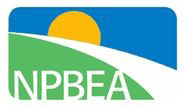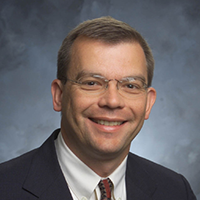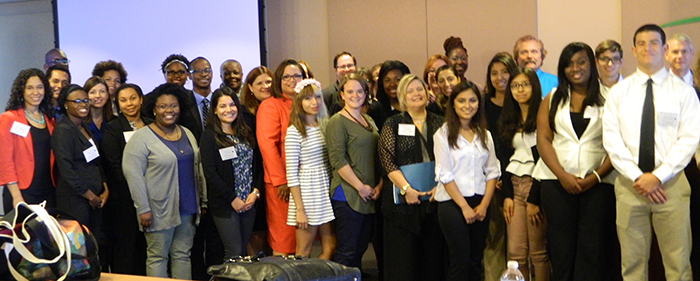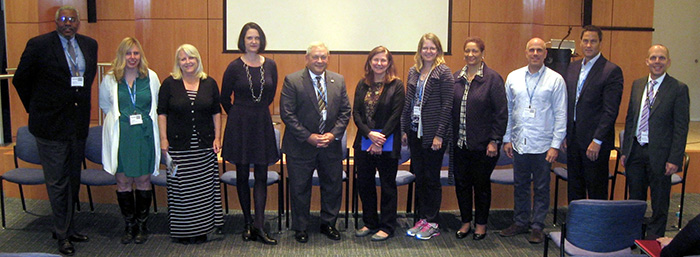03 Nov2015
By Susan Korach
While the impact of partnerships is not yet fully understood, there is a growing body of evidence that suggests that school districts that partner with local principal training providers are more likely to leverage programmatic changes that result in principals who are better equipped to lead schools to improve student performance.
— Cheryl King, Quality Measures: Partnership Effectiveness Continuum (2014)
Last month, I had the privilege of joining colleagues from around the country to present an AACTE webinar about building school-university partnerships to support stronger preparation of school leaders. A recording of the webinar is now available here.
27 Oct2015
By Kristin McCabe

Last week, the National Policy Board for Educational Administration (NPBEA) voted unanimously to approve revised standards for education leaders. The 2015 Professional Standards for Educational Leaders, formerly known as the Interstate School Leaders Licensure Consortium (ISLLC) standards, are currently available in summary form and will be published officially next month.
The Council of Chief State School Officers (CCSSO), which owns the standards’ copyright, worked closely with other members of NPBEA to refresh the ISLLC standards, which were first published in 1996 and last updated in 2008. The revision was supported by a grant from the Wallace Foundation and informed by multiple public comment periods and focus groups, culminating in an NPBEA working group charged with finalizing the standards based on feedback from more than 1,000 principals, superintendents, and others in the field.
16 Oct2015
By Jerrica Thurman
Did you know October is National Principals Month? While we appreciate our school leaders year round, this month is a special time to honor principals for their leadership and vital work in schools.
National Principals Month is a broad celebration of the principalship, marked by national and state resolutions, formal awards and recognitions, and acknowledgments from U.S. senators and representatives and other top government officials. It is an opportunity to say “thank you” to principals across the nation and to share with the community all the great things that principals do.
13 Oct2015
By Jerrica Thurman

AACTE congratulates Christopher A. Koch on his new appointment as president of the Council for the Accreditation of Educator Preparation (CAEP), announced today. He will oversee the national effort to implement an evidence-based accreditation system that aims to improve teacher quality and strengthen PK-12 learning.
“Chris is an ideal leader for CAEP,” said AACTE President/CEO Sharon P. Robinson. “He has experience partnering with teacher educators to meet the educational needs of diverse student populations. His dedication to service and the teaching profession is deep and profound, and his commitment to collaboration is evident. He has earned high regard as a trusted collaborator for the essential function of program accreditation.”
13 Oct2015
By Amanda Lester and Omar Davis

Participants in the inaugural Project LEAD Summit of the Associated Colleges of Illinois
On September 25, AACTE staff had the privilege of taking part in the inaugural Project LEAD (Leaders in Education Advocating for Diversity) Summit in Chicago, Illinois. The summit was a daylong conference conducted by the Associated Colleges of Illinois Center for Success in High-Need Schools to engage teacher candidates and faculty in interactive discussions focused on increasing diversity in the teacher workforce.
06 Oct2015
By Sharon Robinson

Participants in the 2015 National Technology Leadership Summit included the heads of educator preparation associations for literacy, English, special education, engineering, science, mathematics, and more.
Last week, AACTE hosted an annual technology summit for the leaders of 10 teacher educator associations that formed a coalition in 2000 around educational technology and educator preparation. This 2-day event has witnessed or directly led to some amazing developments over the years, ranging from research to tools to entirely new technologies, as coalition members serve as a unique focus group and visionary working network bridging education and industry.
06 Oct2015
By Angela Maynard Sewall
In his book Innovation and Entrepreneurship, Peter Drucker advised, “Don’t try to innovate for the future. Innovate for the present.” How helpful this wisdom is for everyone in the education field, whether PK-12 or higher education! For our students and our society, the future is now. Participants in the Wallace Foundation’s Principal Pipeline Initiative have taken that advice to heart as they have worked on practical, deployable strategies to improve how principals are recruited, prepared, and supported in urban schools, right now. The six districts and multiple higher education partners already are seeing improvement in student learning as a result of their work over the past few years.
On Thursday, October 15, the second webinar in AACTE’s free series on the Principal Pipeline Initiative will explore “Building the Partnerships” to bridge the differences among institutions and programs in the pursuit of their common goals. Like the first webinar, which discussed “Laying the Foundation,” this event will feature a panel of school and university leaders who’ve participated in the initiative. Panelists will discuss inputs needed, agreements and protocols, and the impact and outcomes of building new and stronger partnerships among the key groups.
06 Oct2015
By Hannah Maes
The first webinar in AACTE’s series on the Wallace Foundation’s Principal Pipeline Initiative drew some 110 participants last month. (The second, which will also be free of charge, will be held October 15; read Angela Sewall’s post about it here.) As they heard from the initiative’s panelists about their ongoing work to reform principal preparation through collaborations among higher education institutions and school districts, the webinar participants began to echo the presenters’ enthusiasm for the model’s potential if brought to a larger scale.
06 Oct2015
By James O’Meara and Sharon Robinson
On September 25, 2012, United Nations Secretary-General Ban Ki Moon launched the UN Global Education First Initiative (GEFI) for making quality education available to all children, young people, and adults. This year, on the third anniversary of the GEFI launch, leaders from AACTE answered his call for assistance by committing to revive a longstanding partnership with the International Council on Education for Teaching (ICET). But why ICET, and why now?
What Is ICET?
ICET is a nongovernmental organization (NGO) working with educator preparation providers (EPPs) globally to ensure all learners will have access to a high-quality education in which educators are appropriately qualified and recognized as motivated and committed professionals and practitioners.
29 Sep2015
By Hannah Maes and Tim Finklea
The 2015 Fall CAEP Conference in partnership with AACTE was held September 17-19 in Washington, DC, drawing a crowd of more than 1,300 education professionals to talk process, progress, and partnerships in quality educator preparation and accreditation. And it’s already time to submit session proposals for both of next year’s CAEPCons—they are due this Sunday, October 4, by midnight EDT.
15 Sep2015
By Mark LaCelle-Peterson and Rodrick Lucero
Last month, we were honored to participate and speak at a convening to support teacher educators in their work to prepare teachers to educate all learners, including students with disabilities. At the meeting in Indianapolis in August, the University of Florida’s Collaboration for Effective Educator Development, Accountability, and Reform (CEEDAR) Center convened educator preparation leaders from the center’s partner states to support their shared reform agenda.
01 Sep2015
By Sharon Robinson
This post also appears on the Public School Insights blog of the Learning First Alliance.
Educators from PK-12 schools and higher education share the goal of preparing preservice teachers in a way that develops candidates’ skills, contributes positively to student growth, and stimulates mutual renewal of schools and collegiate preparation programs. The conception of clinical experience as a few weeks of student teaching not only is antiquated but runs counter to our professional commitment to quality. Instead, today’s preparation programs are nurturing complex clinical partnerships with yearlong residencies or internships that both produce beginning teachers who are practice-ready and support a process that strengthens the schools’ capacity to deliver high-quality education for their students.
25 Aug2015
By Kristin McCabe
In a new series of short videos, superintendents of six large, urban school districts around the country share lessons for improving development of leaders for their districts’ schools. AACTE members working to prepare leaders for schools and districts may find the videos to be a useful resource for their candidates.
The series features the superintendents in Charlotte-Mecklenburg (NC), Denver (CO), Gwinnett County (GA), Hillsborough County (FL), New York (NY), and Prince George’s County (MD), which have been participating in the Wallace Foundation’s Principal Pipeline Initiative for several years. (AACTE is a communications partner for the initiative and, along with its members, is devoting new attention to principal preparation, beginning with a survey this fall.)
04 Aug2015
By Sungti Hsu
A new report calls on states to ensure more intentional preparation of educators to work with struggling learners, including students with disabilities, English language learners, and students with unidentified learning and behavior needs, to address persistent achievement gaps. The report, issued by the Council of Chief State School Officers (CCSSO) and the University of Florida’s Collaboration for Effective Educator Development, Accountability, and Reform (CEEDAR) Center, builds on a 2012 paper from CCSSO about policies to transform educator preparation generally—whose recommendations were supported by AACTE—and echoes messages of a recent policy brief developed by AACTE and the National Center for Learning Disabilities.
04 Aug2015
By Sharon Robinson and Joe A. Hairston
As the first cohort of leaders embarks on their course of study with the new AASA Urban Superintendents Academy at Howard University and the University of Southern California, we are thrilled to see this promising work come to life. Urban districts desperately need forward-thinking leaders, particularly those from underrepresented demographic groups, prepared to be barrier-busting champions for every student in their care.
Following an intensive kick-off conference later this month, participants in the Academy—predominantly from underrepresented racial/ethnic groups—will spend the academic year undertaking internships in the field, focusing on problems of practice under the guidance of experienced mentors, and taking graduate courses at the university before completing culminating projects. These participants, in-service administrators who want to enrich their field experience and training for urban settings or prospective superintendents, will be prepared for certification through the program.
What is so promising about the Academy?










